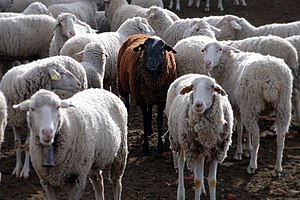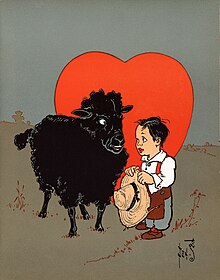What Does It Mean to Be the Black Sheep of the Family

A black sheep stands out from the flock.

In the English language linguistic communication, black sheep is an idiom used to draw a member of a group, different from the remainder, especially inside a family, who does non fit in. The term stems from sheep whose fleece is colored black rather than the more than mutual white; these sheep stand up out in the flock and their wool was traditionally considered less valuable as it was not able to be dyed.
In big herds, black sheep are used because they contrast against the mural amend than their white siblings. Usually, 1 black sheep accompanies 100 white sheep in a flock of i,000 or more than, so that shepherds can easily count a flock.[ citation needed ]
The term has typically been given negative implications, implying waywardness.[1]
In psychology, the black sheep outcome refers to the trend of grouping members to gauge likeable ingroup members more positively and deviant ingroup members more negatively than comparable outgroup members.[2]
Origin [edit]
In most sheep, a white fleece is not caused by albinism only by a mutual ascendant gene that switches color production off, thus obscuring any other color that may be present.[ citation needed ] A black fleece is caused past a recessive gene, so if a white ram and a white ewe are each heterozygous for black, virtually i in 4 of their lambs will exist blackness. In nearly white sheep breeds, merely a few white sheep are heterozygous for black, so black lambs are usually much rarer than this.
Idiomatic usage [edit]
The term originated from the occasional blackness sheep which are born into a flock of white sheep. Blackness wool was considered commercially undesirable because it could not be dyed.[one] In 18th and 19th century England, the black color of the sheep was seen as the mark of the devil.[three] In modern usage, the expression has lost some of its negative connotations, though the term is usually given to the member of a group who has certain characteristics or lack thereof deemed undesirable past that grouping.[4] Jessica Mitford described herself as "the cherry-red sheep of the family", a communist in a family of aristocratic fascists.[v]
The idiom is as well found in other languages, due east.g. German, French, Italian, Serbian, Bulgarian, Hebrew, Portuguese, Bosnian, Greek, Turkish, Hungarian, Dutch, Afrikaans, Swedish, Danish, Spanish, Catalan, Czech, Slovak, Romanaian and Polish. During the 2nd Spanish Republic a weekly magazine named El Be Negre, meaning 'The Blackness Sheep', was published in Barcelona.[6]
The same concept is illustrated in some other languages by the phrase "white crow": for case, belaya vorona ( бе́лая воро́на ) in Russian and kalāg-due east sefīd ( کلاغ سفید ) in Persian.
In psychology [edit]
In 1988, Marques, Yzerbyt and Leyens conducted an experiment where Belgian students rated the following groups according to trait-descriptors (due east.one thousand. sociable, polite, trigger-happy, common cold): unlikeable Belgian students, unlikeable North African students, likeable Belgian students, and likeable North African students. The results indicated that favorability is considered highest for likeable ingroup members and lowest for unlikeable ingroup members, with the favorability of unlikeable and likeable outgroup members lying betwixt the 2 ingroup members.[2] These extreme judgements of likeable and unlikeable (i.e., deviant) ingroup members, relatively to comparable outgroup members is called "black sheep effect". This effect has been shown in diverse intergroup contexts and under a diverseness of conditions, and in many experiments manipulating likeability and norm deviance.[seven] [viii] [ix] [10]
Explanations [edit]

A prominent explanation of the blackness sheep event derives from the social identity approach (social identity theory[11] and self-categorization theory[12]). Group members are motivated to sustain a positive and distinctive social identity and, as a consequence, grouping members emphasize likeable members and evaluate them more than positive than outgroup members, bolstering the positive image of their ingroup (ingroup bias). Furthermore, the positive social identity may be threatened by grouping members who deviate from a relevant group norm. To protect the positive group prototype, ingroup members derogate ingroup deviants more harshly than deviants of an outgroup (Marques, Abrams, Páez, & Hogg, 2001).[13]
In addition, Eidelman and Biernat showed in 2003 that personal identities are also threatened through deviant ingroup members. They argue that devaluation of deviant members is an individual response of interpersonal differentiation.[xiv] Khan and Lambert suggested in 1998 that cognitive processes such as assimilation and contrast, which may underline the effect, should exist examined.[ix]
Limitations [edit]
Even though at that place is wide support for the black sheep effect, the opposite pattern has been found, for example, that White participants gauge unqualified Black targets more negatively than comparable White targets (e.grand. Feldman, 1972;[15] Linville & Jones, 1980).[16] Consequently, in that location are several factors which influence the blackness sheep effect. For instance, the higher the identification with the ingroup, and the higher the entitativity of the ingroup, the more the black sheep consequence emerges.[17] [18] Even situational factors explaining the deviance have an influence whether the blackness sheep effect occurs.[nineteen]
as a projection
To put it more than precisely, a "black sheep" is an outsider who stands out due to characteristics or behavior that exercise not correspond to the ideas or rules that utilise and are accustomed in the group. This divergence is rated as unpleasant by the other group members or felt as "shameful". In doing and so, people who are different are not only fabricated responsible for their own beliefs, but also by and large blamed for grievances in the group.[ii]
In the grouping dynamic, the "black sheep" in the role of the outsider fulfills an of import function equally a scapegoat. The group strengthens the inner cohesion at the expense of the outsider (bullying). Uncomfortable fearful grouping bug are kept out of the grouping past beingness projected and personified onto the outsider. The outsider is therefore a carrier of of import and valuable energy and can - properly integrated - contribute significantly to the positive development of the group and its work.[3]
Encounter as well [edit]
- Black swan theory
- Glossary of sheep husbandry
- Scapegoat
- Baa Baa Black Sheep
- The Ugly Duckling
References [edit]
- ^ a b Ammer, Christine (1997). American Heritage Dictionary of Idioms . Houghton Mifflin Harcourt. p. 64. ISBN978-0-395-72774-4 . Retrieved 2007-eleven-13 .
- ^ a b Marques, J. M.; Yzerbyt, V. Y.; Leyens, J. (1988). "The 'Black Sheep Issue': Extremity of judgments towards ingroup members as a function of group identification". European Journal of Social Psychology. 18: ane–16. doi:10.1002/ejsp.2420180102.
- ^ Sykes, Christopher Simon (1983). Black Sheep. New York: Viking Press. p. xi. ISBN978-0-670-17276-4.
- ^ The American Heritage Lexicon of Idioms. Houghton Mifflin Visitor. 1992. Archived from the original on 2008-04-15. Retrieved 2008-03-24 .
- ^ "Ruddy Sheep: How Jessica Mitford institute her voice" past Thomas Mallon 16 Oct 2007 New Yorker Archived 6 June 2011 at the Wayback Machine.
- ^ El be negre (1931-1936) - La Ciberniz Archived 2013-02-eleven at the Wayback Auto
- ^ Branscombe, N.; Wann, D.; Noel, J.; Coleman, J. (1993). "In-group or out-group extremity: Importance of the threatened social identity". Personality and Social Psychology Bulletin. 19 (4): 381–388. doi:ten.1177/0146167293194003.
- ^ Coull, A.; Yzerbyt, V. Y.; Castano, Due east.; Paladino, M.-P.; Leemans, V. (2001). "Protecting the ingroup: Motivated allocation of cognitive resource in the presence of threatening ingroup members". Group Processes & Intergroup Relations. 4 (iv): 327–339. CiteSeerX10.1.1.379.3383. doi:x.1177/1368430201004004003.
- ^ a b Khan, S.; Lambert, A. J. (1998). "Ingroup favoritism versus black sheep effects in observations of breezy conversations". Bones and Applied Social Psychology. twenty (4): 263–269. doi:x.1207/s15324834basp2004_3.
- ^ Pinto, I. R.; Marques, J. M.; Levine, J. M.; Abrams, D. (2010). "Membership status and subjective group dynamics: Who triggers the black sheep result?". Periodical of Personality and Social Psychology. 99 (1): 107–119. doi:10.1037/a0018187. PMID 20565188.
- ^ Worchel, S.; Austin, Due west. G. (1979). The Social psychology of intergroup relations. Monterey, CA: Brooks-Cole.
- ^ Turner, J. C.; Hogg, Chiliad. A.; Oakes, P. J.; Reicher, S. D.; Wetherell, M. Due south. (1987). Rediscovering the Social group: A self-categorization theory. Oxford: Blackwell.
- ^ Hogg, K. A.; Tindale, Southward. (2001). Blackwell handbook of social psychology: grouping processes. Malden, Mass: Blackwell.
- ^ Eidelman, S.; Biernat, M. (2003). "Derogating black sheep: Private or grouping protection?". Journal of Experimental Social Psychology. 39 (6): 602–609. doi:10.1016/S0022-1031(03)00042-viii.
- ^ Feldman, J. M. (1972). "Stimulus characteristics and discipline prejudice as determinants of stereotype attribution". Journal of Personality and Social Psychology. 21 (3): 333–340. doi:10.1037/h0032313.
- ^ Linville, P. W.; Jones, Eastward. E. (1980). "Polarized appraisals of out-group members". Journal of Personality and Social Psychology. 38 (five): 689–703. doi:10.1037/0022-3514.38.five.689.
- ^ Castano, Eastward.; Paladino, M.; Coull, A.; Yzerbyt, V. Y. (2002). "Protecting the ingroup stereotype: Ingroup identification and the management of deviant ingroup members". British Journal of Social Psychology. 41 (3): 365–385. doi:10.1348/014466602760344269. PMID 12419008. S2CID 2003883.
- ^ Lewis, A. C.; Sherman, S. J. (2010). "Perceived entitativity and the black-sheep effect: When will we denigrate negative ingroup members?". The Journal of Social Psychology. 150 (two): 211–225. doi:10.1080/00224540903366388. PMID 20397595.
- ^ De Cremer, D.; Vanbeselaere, N. (1999). "I am deviant, considering...: The impact of situational factors upon the black sheep consequence". Psychologica Belgica. 39: 71–79.
External links [edit]
| | Expect upward black sheep in Wiktionary, the costless lexicon. |
- Exploration of the etymology of the phrase "blackness sheep of the family"
- Marques, José Thousand.; José M. Marques; Vincent Y. Yzerbyt (1988). "The black sheep effect: Judgmental extremity towards ingroup members in inter-and intra-group situations". European Journal of Social Psychology. eighteen (three): 287–292. doi:x.1002/ejsp.2420180308. Retrieved 2008-01-04 .
Source: https://en.wikipedia.org/wiki/Black_sheep
0 Response to "What Does It Mean to Be the Black Sheep of the Family"
Post a Comment